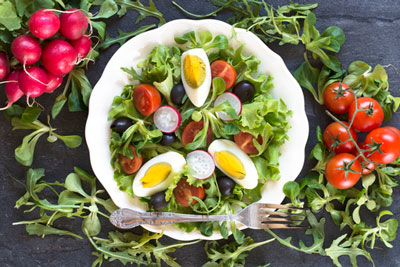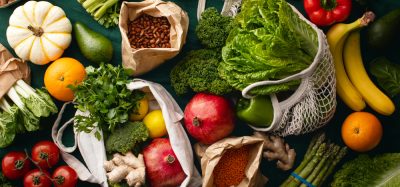Eggs are the secret ingredient for improved absorption of carotenoids
- Like
- Digg
- Del
- Tumblr
- VKontakte
- Buffer
- Love This
- Odnoklassniki
- Meneame
- Blogger
- Amazon
- Yahoo Mail
- Gmail
- AOL
- Newsvine
- HackerNews
- Evernote
- MySpace
- Mail.ru
- Viadeo
- Line
- Comments
- Yummly
- SMS
- Viber
- Telegram
- Subscribe
- Skype
- Facebook Messenger
- Kakao
- LiveJournal
- Yammer
- Edgar
- Fintel
- Mix
- Instapaper
- Copy Link
Posted: 9 June 2015 | Victoria White | No comments yet
Adding eggs to a salad with a variety of raw vegetables is an effective method to improve the absorption of carotenoids, according to new research…


Adding eggs to a salad with a variety of raw vegetables is an effective method to improve the absorption of carotenoids, according to research from Purdue University.


Carotenoids are fat-soluble nutrients that help reduce inflammation and oxidative stress.
“Eating a salad with a variety of colourful vegetables provides several unique types of carotenoids, including beta-carotene, lutein, zeaxanthin and lycopene,” said Wayne Campbell, a professor of nutrition science. “The lipid contained in whole eggs enhances the absorption of all these carotenoids.”
Jung Eun Kim, a postdoctoral researcher in Purdue’s Department of Nutrition Science, said, “Our research findings support that people obtained more of the health-promoting carotenoids from raw vegetables when cooked whole eggs were also consumed. Eggs, a nutrient-rich food containing essential amino acids, unsaturated fatty acids and B vitamins, may be used to increase the nutritive value of vegetables.”
Absorption of carotenoids was up to eight times higher when a salad contained three eggs
In the study, 16 participants consumed a raw mixed-vegetable salad with no eggs, a salad with one and a half eggs, and a salad with three eggs at different times. All salads were served with three grams of canola oil. The second salad had 75 grams of scrambled whole eggs and the third 150 grams of scrambled whole eggs. The absorption of carotenoids was 3 to 8 times higher when the salad included three eggs compared to no eggs.
The study used scrambled eggs to make sure the participants consumed both the yolk and egg whites.
“While other egg forms were not tested, we believe the results would be comparable as long as the egg yolk is consumed,” said Campbell, whose research also has looked at salads with different amounts of soybean oil, rapeseed oil and butter. “The lipids in salad dressings also increase the absorption of carotenoids but it is easy to overuse salad dressings and consume excess calories. Many salad dressings contain about 140-160 calories per serving, about two tablespoons. One large whole egg is about 70 calories and provides 6 grams of protein. People are at a greater risk of putting too many calories on a salad because they don’t always know proper portion sizes for salad dressings, but you do know the portion size of an egg.”
This research is published online in the American Journal of Clinical Nutrition.









